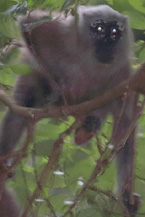Get
To Know
|
 The Moor Macaque is endemic to the tropical rainforests and
grasslands of the island of Sulawesi in Indonesia. Their diet consists
of they eat figs, bamboo seeds, buds, sprouts, invertebrates and
cereals. They have brown to black body fur with a pale rump patch
and pink bare skin on the rump and are about 55 centimetres in height.
They are sometimes called a "dog-ape" because of their dog-like
muzzle, although they are no more closely related to apes than any
other Old World monkey. Adult male moor macaques do not interact
frequently, although the interactions that occur frequently involve
affiliation rather than aggression, with greetings being the most
common form of interaction. The greetings enable males to show their
willingness to invest in the relationship, and may represent one
way for adult males to ease social tension and build social bonds.
The moor macaque is threatened mostly due to habitat loss from an
expanding human population and deforestation to increase agricultural
land area. The population is estimated to have decreased from 56,000
to under 10,000 from 1983 to 1994. In 1992, Supriatna et al. conducted
an extensive survey and found only 3,000-5,000 individuals of the
species. The survey estimated densities to be 25-50 individuals
per kilometre. Several Sulawesi macaque species are endangered,
and information on their ecology and behaviour is desperate needed
if conservation plans are to be effective.
The Moor Macaque is endemic to the tropical rainforests and
grasslands of the island of Sulawesi in Indonesia. Their diet consists
of they eat figs, bamboo seeds, buds, sprouts, invertebrates and
cereals. They have brown to black body fur with a pale rump patch
and pink bare skin on the rump and are about 55 centimetres in height.
They are sometimes called a "dog-ape" because of their dog-like
muzzle, although they are no more closely related to apes than any
other Old World monkey. Adult male moor macaques do not interact
frequently, although the interactions that occur frequently involve
affiliation rather than aggression, with greetings being the most
common form of interaction. The greetings enable males to show their
willingness to invest in the relationship, and may represent one
way for adult males to ease social tension and build social bonds.
The moor macaque is threatened mostly due to habitat loss from an
expanding human population and deforestation to increase agricultural
land area. The population is estimated to have decreased from 56,000
to under 10,000 from 1983 to 1994. In 1992, Supriatna et al. conducted
an extensive survey and found only 3,000-5,000 individuals of the
species. The survey estimated densities to be 25-50 individuals
per kilometre. Several Sulawesi macaque species are endangered,
and information on their ecology and behaviour is desperate needed
if conservation plans are to be effective.
|
|
|
|
Don't get too attached to the girl.
You know we cannot keep her.
Probably, she has a mother
Somewhere, a father
Somewhere. You don't
Know where she has been or what
Sort of diseases she may have
Picked up. Surely, she belongs
To someone. A girl that age
Can wonder off, go feral
For only so long. Some family
Is out looking for her now, I would bet.
I do bet. You cannot make a home
For every stray you run across.
So many strays,
And our home already balanced.
It is a noble gesture, but not practical.
Think of the upkeep. The feeding.
The baths. The education. The endless
Moral instruction. You
Would have to clean up after her,
Everyday, everyday. And then the ruckus
That would come when she hits menarche!
I know you think that to keep her
Is the right thing to do, but we are not
Well suited as a home for lost ragamuffins.
We are all about routines, and an ordered life.
It is too much responsibility. No matter
How huge your heart. But tonight
She can sleep in the garage. We might leave
A blanket and one of your sister's outgrown
Fanciful stuffed animals. Tomorrow,
First thing, after pancakes and peanut butter,
Perhaps an orange juice and maybe milk,
Off she goes and this whole meeting will be forgotten.
She can take the stuffed animal with her.
After years of impersonating a Systems Engineer, Ken has
retired to watch his wife of forty-one years continue to break both Masters
and Open world raw powerlifting records. Kenís two current poetry and
two short fiction collections are available from Barking Moose Press,
Amazon, and Sundial Books in Chincoteague, where Ken and Karen go to escape
irreality.
|
 The
Moor Macaque - Issue
Thirty-Five
The
Moor Macaque - Issue
Thirty-Five